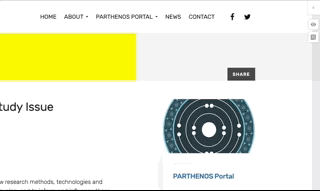How does the Hub approach …
Open Access?
It is the aim that issues and all their parts published on the PARTHENOS Hub are completely open, free and accessible. Wherever possible, resources published as Open Access at other places are linked through a persistent identifier (PID) and the texts are directly accessible. Relevant content that originally is not persistently available will be stored in an Open Access repository and linked with a persistent identifier whenever there are no legal or other constraints prohibiting it. The preferred version of Open Access is the Creative Commons licence cc by, so reuse is possible and the original author gets her/his credits. In order to cover the state of the art, it unfortunately might still be necessary to cite references which are not available as Open Access.
Persistent identifier?
All open accessible resources (as parts of an issue) will have a persistent identifier to enable direct and permanent access. Resources (blog texts, videos etc.) originally without persistent identifiers will be stored in an Open Access repository providing a persistent identifier whenever there are no legal or other constraints prohibiting it. It is the intention, as a second step, to store whole issues in a repository, too, to ensure persistency of single issues.
Citation?
For every issue a suggestion how to cite it is provided in order to make sure that all due credit can be given to the editor(s) and the issue can easily be found and accessed when cited.
Reader participation?
All original text in an issue can be annotated after you have registered for Hypothesis (see: For readers). All annotations are public and will become a persistent part of an issue. Comments, annotations, suggestions for additions of new documents/resources will be taken into consideration for an updated edition of an issue if the editor or the responsible successor(s) decide(s) to publish an updated version. The original versions will remain unchanged with all comments.
Annotation with Hypothesis?
To use Hypothesis for annotation, readers need to sign up for a free account on the Hypothesis website. Note that there will be the need to confirm the email address used for the log in, so it might be necessary to check the spam filter, depending on the email client. Once this is done, it is possible to log into Hypothesis and start annotating. It is also possible to hide the annotations by clicking on the small arrow on the left side of the Hypothesis column as shown in the image below.

Text can be highlighted and/or annotated – the annotations will appear on the right hand side of the web page. It is also possible to reply to annotations done by others and start a conversation immediately.
Feedback?
Comments on a specific issue, see above: Reader participation.
On the PARTHENOS Hub (set-up or in general), please feel free to contact us via E-Mail or via this contact form.

